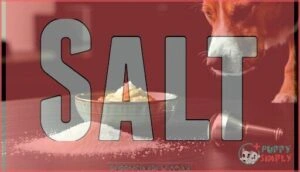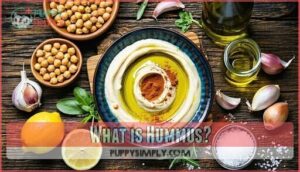This site is supported by our readers. We may earn a commission, at no cost to you, if you purchase through links.

While it might seem like a harmless treat, hummus contains garlic and onions that are toxic to dogs and can damage their red blood cells.
The high salt content can also cause dehydration and sodium poisoning in your pup.
Even the lemon juice and spices commonly found in hummus can trigger digestive upset, vomiting, and diarrhea.
Though plain chickpeas aren’t dangerous on their own, the other ingredients turn this creamy dip into a health hazard for your four-legged friend.
Stick to dog-safe treats instead, and there’s much more you should know about protecting your pet.
Table Of Contents
- Key Takeaways
- Is Hummus Safe for Dogs?
- Why Can’t Dogs Eat Hummus?
- Can Dogs Eat Flavored Hummus?
- Can Dogs Eat Low-Fat Hummus?
- What is Hummus?
- Can Puppies Eat Hummus?
- What to Do if My Dog Has Eaten Hummus?
- Can Cats Eat Hummus?
- Other Foods to Avoid Feeding Dogs
- What’s in Hummus?
- Frequently Asked Questions (FAQs)
- What happens if a dog eats hummus?
- Can dogs eat cooked chickpeas?
- Can dogs eat hummus with garlic?
- Can dogs eat green hummus?
- Can dogs eat red pepper hummus?
- Can dogs eat hummus dip?
- What Are the Health Benefits of Feeding Hummus to Dogs?
- Is Homemade Hummus Safer for Dogs?
- Are Any Seasonings Safe for Dogs to Eat in Hummus?
- How Much Hummus Is Safe for Dogs to Eat?
- Conclusion
Key Takeaways
- Don’t give your dog hummus – it contains garlic and onions that are toxic to dogs and can cause life-threatening anemia by damaging their red blood cells.
- Watch for poisoning symptoms if your dog accidentally eats hummus – look out for vomiting, diarrhea, lethargy, pale gums, and breathing problems, then contact your vet immediately.
- High sodium and spices cause additional problems – the salt content can lead to dehydration and sodium poisoning, while lemon juice and spices trigger digestive upset in your pup.
- Offer plain cooked chickpeas instead – you can safely give your dog the main ingredient without the dangerous seasonings, providing protein and fiber without health risks.
Is Hummus Safe for Dogs?
Despite its popularity at parties, hummus for dogs isn’t the treat you’d hope it would be.
Most store-bought varieties contain garlic and onions, which create serious toxicity levels that can damage your pup’s red blood cells.
While homemade hummus might seem safer, even small amounts pose risks due to harmful seasonings.
The symptoms severity ranges from mild stomach upset to dangerous anemia.
Instead of wondering "is hummus safe," focus on proven safe ingredients like plain cooked chickpeas.
Your dog’s health deserves better than these toxic foods dogs should avoid.
High sodium content can also be a concern, potentially leading to health issues for your furry friend.
Why Can’t Dogs Eat Hummus?
You shouldn’t give your dog hummus because it contains several ingredients that can harm their health, including garlic, salt, lemon juice, and various spices.
While chickpeas themselves are safe for dogs, the other components in traditional hummus recipes can cause digestive upset, toxicity, and even serious health complications like anemia.
Garlic Toxicity
Garlic poses serious health risks to your dog, making traditional hummus a dangerous treat.
Traditional hummus spells trouble for your furry friend—garlic makes this popular dip a dangerous choice.
This common ingredient triggers oxidative damage to red blood cells, potentially causing life-threatening complications. Even small amounts of garlic can cause hemolytic anemia, a condition dangerous to dogs.
- Garlic poisoning develops even from small amounts, causing weakness and lethargy
- Anemia risk increases substantially with any garlic consumption
- Toxicity levels vary by dog size, but no amount is considered safe
- Long-term effects include compromised immune function and cardiovascular problems
Onion Toxicity
While garlic poses serious risks, onions pack an equally dangerous punch for your furry friend.
These toxic foods dogs should never consume contain N-propyl disulfide, which destroys red blood cells and causes life-threatening anemia.
Cooking methods don’t eliminate the danger—raw, cooked, or powdered onions remain harmful.
Alternative alliums like chives and leeks share this pet toxicity risk.
Breed sensitivity varies, but even small amounts can trigger lethargy, vomiting, and breathing problems.
Toxicity levels accumulate over time, making repeated exposure particularly dangerous for your dog’s health.
Even a small amount, such as one-tenth of a medium onion, can be toxic to small dogs.
Lemon Juice
When you spot lemon juice in your favorite hummus recipe, think twice before sharing it with your furry friend.
This citrus addition contains high levels of citric acid that can trigger digestive discomfort in dogs.
Their sensitive stomachs aren’t designed for this unnatural diet component, making lemon juice one of those toxic foods dogs should avoid.
The acidic properties can cause immediate stomach upset, while lemon peels contain psoralens toxicity that’s particularly dangerous.
Instead of risking your dog’s health with hummus containing lemon juice, consider safe alternatives like plain cooked chickpeas for pet safety.
This approach ensures you can enjoy your favorite snack while also protecting your dog from potential harm, prioritizing their health with pet safety.
Salt
Salt transforms from kitchen staple to canine threat faster than you’d expect.
Commercial hummus packs dangerous sodium content that triggers salt poisoning in dogs.
Even small amounts cause dehydration risks and strain kidney health.
Your pup’s body can’t process excess sodium like yours can.
Skip store-bought varieties entirely.
Instead, explore safe alternatives like plain cooked chickpeas.
Protecting your dog’s health means understanding these toxic foods and pet safety basics completely.
Spices
Beyond garlic and onions, common spices in hummus create serious spice sensitivities in dogs.
Cumin, paprika, and other seasonings trigger gastrointestinal irritation and inflammatory responses your pup can’t handle.
These toxic foods overwhelm their digestive systems, causing vomiting and diarrhea.
While safe spices exist, spice quantities in store-bought hummus exceed what’s healthy.
Skip spice alternatives—plain ingredients work best for canine safety.
Can Dogs Eat Flavored Hummus?
Flavored hummus varieties like spicy hummus, roasted pepper, sun-dried tomato, and olive hummus pose serious hummus dangers for your dog.
Even garlic-free flavors contain problematic ingredients that can trigger gastrointestinal symptoms.
These commercial varieties pack higher sodium levels and artificial additives that increase pet poisoning risks.
Spices in flavored versions can cause digestive upset, while preservatives may trigger allergic reactions.
The combination of toxic foods and flavor enhancers makes all flavored hummus consistently unsafe for canine consumption, regardless of the specific variety.
Can Dogs Eat Low-Fat Hummus?
Low-fat hummus might seem like a healthier choice for your dog’s nutrition, but it’s still risky business.
Even reduced-fat versions contain garlic and onions, which are toxic to your pup’s digestive system.
Commercial brands sneak in extra salt and spices that can upset your dog’s stomach.
Instead of gambling with ingredient concerns, stick to safe alternatives like plain cooked chickpeas.
Your dog’s health isn’t worth the risk, regardless of any low-fat benefits these products might advertise.
What is Hummus?
You’ve probably seen hummus in your local grocery store or at dinner parties, but this creamy Middle Eastern dip is made from mashed chickpeas, tahini, olive oil, garlic, lemon juice, and salt.
While it’s a nutritious superfood for humans, packed with protein and fiber, the ingredients that make hummus delicious for us can create serious health problems for your dog.
Chickpeas
Chickpeas pack a nutritional punch for your dog’s diet.
These protein-rich legumes offer fiber, potassium, and essential vitamins that support dog health and digestive system function.
However, chickpea preparation matters—serve them plain, cooked, and unseasoned.
While chickpea benefits include improved digestion, watch for chickpea allergies.
Consider chickpea alternatives if your pup shows sensitivity to this dog nutrition powerhouse.
Olive Oil
Olive oil brings that silky texture to hummus, but here’s the scoop: it’s not automatically a green light for your furry friend.
While olive oil benefits include healthy fats for humans, safe amounts for dogs are much smaller than you’d think.
Your dog’s digestive system processes fats differently than yours, making moderation key for dog health.
Consider these olive oil facts for dog nutrition:
- High calorie content – just one tablespoon packs 120 calories
- Digestive sensitivity – too much causes stomach upset
- Alternative oils like coconut oil may be gentler
- Skin benefits exist but require veterinary guidance
- Oil types vary in safety for dog diet needs
Tahini
Made from ground sesame seeds, tahini brings creamy richness to hummus.
While tahini nutrition offers healthy fats and protein, it’s generally safe for dogs in tiny amounts.
However, tahini allergies can trigger gastrointestinal symptoms in sensitive pups.
This dense paste may challenge your dog’s digestive system, so moderation matters when considering hummus ingredients.
| Tahini Component | Dog Safety Level | Potential Impact |
|---|---|---|
| Sesame Seeds | Generally Safe | May cause mild digestive upset |
| High Fat Content | Moderate Risk | Can lead to weight gain |
| Dense Texture | Low Risk | Possible choking hazard |
| Natural Oils | Safe in Small Amounts | Supports coat health |
Tahini benefits include essential fatty acids, but tahini digestion can be challenging for some dogs.
Consider tahini alternatives like plain cooked chickpeas when creating dog-friendly snacks, as pet food ingredients should always prioritize your furry friend’s unique digestive needs.
Garlic
Here’s garlic – the biggest red flag in your hummus jar.
This ingredient causes serious pet health risks by damaging your dog’s red blood cells, leading to anemia.
Even small amounts can trigger garlic effects like weakness and pale gums.
Garlic sensitivities vary between dogs, but there’s no safe garlic dosage.
Skip garlic preparation entirely and choose safe snacks for dogs instead of risking whether dogs eat hummus containing this toxic ingredient.
Can Puppies Eat Hummus?
Puppies shouldn’t eat hummus due to their developing digestive systems and increased sensitivity to toxic ingredients.
Their smaller bodies can’t handle garlic compounds that destroy red blood cells, while high sodium levels risk dehydration. Young dogs face greater risks from spices and seasonings that cause inflammation.
Edamame, offering omega-3 fatty acids, can be a safer alternative.
Here are safer puppy nutrition guidelines:
- Plain cooked chickpeas – offer protein without dangerous additives
- Commercial puppy treats – provide balanced nutrition profiles
- Veterinary advice – consult professionals before introducing new foods
- Portion control – limit any treats to prevent digestive upset
What to Do if My Dog Has Eaten Hummus?
Don’t panic if your dog snatched some hummus.
Stay calm – quick action and vet contact can prevent serious complications from accidental hummus consumption.
First, assess symptoms like vomiting or diarrhea within the next few hours.
Contact your vet immediately and describe what happened – they’ll provide specific advice based on your dog’s size and the amount consumed.
Monitor your dog closely for poisoning symptoms including lethargy, pale gums, or unusual behavior.
Keep fresh water available but don’t induce vomiting without professional guidance.
For preventative measures, secure human foods and consider dietary adjustments with vet-approved treats moving forward, ensuring a safe environment and promoting healthy habits with vet-approved guidance.
Can Cats Eat Hummus?
Cats face the same risks as dogs regarding hummus. The garlic in this popular dip can damage your cat’s red blood cells, leading to serious toxicity symptoms like vomiting and lethargy.
Unlike dogs, where chickpeas offer some benefits in hummus situations, cats don’t process these ingredients well either. Their sensitive digestive system mirrors feline concerns.
Expert opinions consistently warn against sharing hummus with cats. One concern is that cat food has higher protein levels, which could cause digestive upset in dogs.
Instead, stick to safe ingredients designed for feline nutrition, or explore alternative dips made specifically for pets.
Other Foods to Avoid Feeding Dogs
Beyond hummus, you’ll want to steer clear of several dangerous foods that pose serious threats to your dog’s health.
Chocolates contain compounds causing chocolate toxicity, while artificial sweeteners like xylitol create xylitol dangers even in tiny amounts.
Avocado risks include stomach upset, and grape concerns involve potential kidney failure.
The allium family – including garlic and onions – damages red blood cells.
Nut allergies can trigger severe reactions, and various spices irritate digestive systems.
It’s essential to understand foods can be toxic to your canine companion, and always check ingredient labels before sharing any human food with your furry friend to avoid chocolate toxicity and ensure their safety with xylitol dangers in mind, considering the allium family risks.
What’s in Hummus?
You know what goes into that creamy dip you love? Hummus ingredients include chickpeas as the base, tahini from ground sesame seeds, olive oil for smoothness, and lemon juice for tang.
Unfortunately, most recipes also contain garlic, which spells trouble for your dog. While chickpea benefits include protein and fiber, and tahini provides healthy fats, the garlic makes store-bought versions off-limits.
Some brands explore garlic alternatives, but it’s safer to skip hummus entirely and offer plain, cooked chickpeas instead. Many consumers buy hummus ingredients online for home recipes to make a healthy version.
Frequently Asked Questions (FAQs)
What happens if a dog eats hummus?
If your dog eats hummus, they’ll likely experience stomach upset, vomiting, or diarrhea due to garlic toxicity.
Watch for lethargy, pale gums, and rapid breathing—these serious symptoms require immediate veterinary attention.
Can dogs eat cooked chickpeas?
Yes, you can feed your dog cooked chickpeas safely. They’re packed with protein, fiber, and vitamins that benefit your pup’s health. Just serve them plain without seasoning, salt, or spices.
Can dogs eat hummus with garlic?
Never feed your dog hummus containing garlic.
Garlic’s toxic to dogs, causing red blood cell damage and potentially fatal anemia.
Even small amounts pose serious health risks, so stick to plain, dog-safe treats instead.
Can dogs eat green hummus?
Green doesn’t change the game here.
Whether it’s spinach, herbs, or avocado making your hummus green, you’re still dealing with garlic and other problematic ingredients that’ll upset your pup’s stomach and potentially cause serious health issues.
Can dogs eat red pepper hummus?
Red pepper hummus isn’t safe for your pup.
It contains garlic, which is toxic to dogs and can damage their red blood cells.
The spices and salt can also upset their stomach, causing vomiting and diarrhea.
Can dogs eat hummus dip?
Like playing with fire, feeding your dog hummus dip isn’t worth the risk.
Most varieties contain garlic, which damages red blood cells and causes anemia.
Skip the dip and offer plain cooked chickpeas instead.
What Are the Health Benefits of Feeding Hummus to Dogs?
Unfortunately, there aren’t any health benefits to feeding your dog hummus.
The garlic and other ingredients pose serious toxicity risks, potentially causing anemia and digestive issues that outweigh any nutritional value.
Is Homemade Hummus Safer for Dogs?
Cooking up your own batch might seem like a safer bet, but homemade hummus still contains garlic and lemon juice.
You’re basically crafting the same toxic cocktail that’ll upset your pup’s stomach and potentially cause serious health issues.
Are Any Seasonings Safe for Dogs to Eat in Hummus?
Most seasonings in hummus aren’t dog-friendly.
Skip garlic, onion powder, and excessive salt – they’re toxic.
Plain herbs like parsley or cilantro in tiny amounts might be okay, but you’re better off avoiding seasoned hummus altogether.
How Much Hummus Is Safe for Dogs to Eat?
Zero hummus is truly safe for your dog – even a teaspoon can trigger serious health problems.
The garlic alone makes any amount dangerous, potentially causing anemia and organ damage that’ll have you rushing to the vet.
Conclusion
Remember, regarding the question of "can dogs eat hummus," the answer is crystal clear as a mountain stream – absolutely not.
Those seemingly innocent ingredients like garlic and onions can seriously harm your furry friend’s health.
Instead of sharing your Mediterranean snack, stick to dog-approved treats that won’t land you at the vet’s office.
Your pup’s safety is worth more than satisfying their curious taste buds, so keep that hummus bowl firmly out of paw’s reach.
- https://baileyscbd.com/blogs/dog-nutrition/hummus-and-dogs-canine-considerations
- https://dogwondersworld.com/dog-health-wellness/can-dogs-eat-hummus/
- https://www.masterclass.com/articles/can-dogs-eat-hummus
- https://butternutbox.com/blog/can-dogs-eat-hummus
- https://www.tryoriginlabs.com/blogs/pet/can-dogs-eat-hummus?srsltid=AfmBOooMaXW3irbpAUbC8ynVSxGb30MuYlCgBB0cdSNh8RwnjYpbL-QN


















